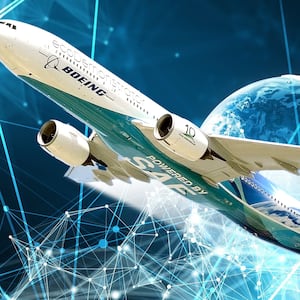Business
Boeing and DHL Champion Sustainable Aviation Fuel in New Zealand

During a recent visit to New Zealand, leaders from Boeing and DHL highlighted the potential economic benefits of sustainable aviation fuel (Saf). They indicated that the adoption of this fuel could contribute an estimated $1.3 billion to the New Zealand economy. The discussions emphasized the commitment of these industry giants to innovate and prioritize sustainability in aviation, despite global challenges.
Sustainable Aviation Fuel: A Game Changer for the Industry
Both companies underscored the importance of Saf, which is derived from a variety of sources, including agricultural and forestry waste, animal fats, vegetable oils, and municipal solid waste. This alternative fuel not only aims to reduce carbon emissions but also represents a significant opportunity for economic growth in the regions where it is produced.
Travis Cobb, the executive vice president for global network operations and aviation at DHL Express, stated, “With a fleet of more than 300 aircraft, we recognize that transitioning to sustainable fuel is critical for the future of trade.” His remarks reflect the broader industry sentiment that sustainable practices are essential for maintaining competitiveness and ensuring the longevity of aviation.
The significance of Saf extends beyond environmental considerations. The development and utilization of sustainable fuels can stimulate local economies by creating jobs in production, distribution, and technology sectors. This aspect was a key point of discussion among the leaders, who are keenly aware of the intertwined nature of environmental responsibility and economic opportunity.
Commitment to Innovation Amid Global Challenges
As the aviation sector navigates through various geopolitical and economic hurdles, Boeing and DHL remain steadfast in their resolve to invest in new technologies. The collaboration between these two companies signals a united front in the pursuit of cleaner and more efficient air travel. Their commitment aligns with global efforts to combat climate change while also enhancing operational efficiencies.
Both companies are hopeful that increased investment in Saf will pave the way for broader adoption across the aviation industry. The potential economic impact on New Zealand is significant, particularly as the country looks to strengthen its position in the global market for sustainable products.
As discussions around sustainable aviation fuel continue, stakeholders in the aviation industry are called to action. The success of these initiatives may determine the future landscape of air travel, balancing economic growth with environmental stewardship.
-

 World4 months ago
World4 months agoTest Your Knowledge: Take the Herald’s Afternoon Quiz Today
-

 Sports4 months ago
Sports4 months agoPM Faces Backlash from Fans During Netball Trophy Ceremony
-

 Lifestyle4 months ago
Lifestyle4 months agoDunedin Designers Win Top Award at Hokonui Fashion Event
-

 Entertainment4 months ago
Entertainment4 months agoExperience the Excitement of ‘Chief of War’ in Oʻahu
-

 Sports4 months ago
Sports4 months agoLiam Lawson Launches New Era for Racing Bulls with Strong Start
-

 World5 months ago
World5 months agoCoalition Forms to Preserve Māori Wards in Hawke’s Bay
-

 Health4 months ago
Health4 months agoWalking Faster Offers Major Health Benefits for Older Adults
-

 Lifestyle4 months ago
Lifestyle4 months agoDisney Fan Reveals Dress Code Tips for Park Visitors
-

 Politics4 months ago
Politics4 months agoScots Rally with Humor and Music to Protest Trump’s Visit
-

 Top Stories5 months ago
Top Stories5 months agoUK and India Finalize Trade Deal to Boost Economic Ties
-

 Health2 months ago
Health2 months agoRadio Host Jay-Jay Feeney’s Partner Secures Visa to Stay in NZ
-

 World5 months ago
World5 months agoHuntly Begins Water Pipe Flushing to Resolve Brown Water Issue









